
Message from the Director
By RANDALL STONE
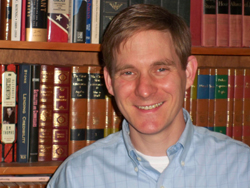
Professor Randall Stone.
“This tragic, cursed Katyn,” said former president
Aleksander Kwasniewski on Polishtelevision. “It sent shivers down my spine. First the flower of the Second Polish Republic
is murdered in the forests around Smolensk. Now the intellectual elite of the Third Polish
Republic die in this tragic plane crash….”
The crash was an accident, apparently attributable to pilot error, and rather than
straining Polish-Russian relations, it has contributed to their recent warming as an
outpouring of sympathy eclipsed previous tensions. Lech Kaczynski, an ambiguous
political figure in life, has been entombed in Wawel Castle and has achieved nearly
mythic proportions in death. He perished on his way to commemorate one of Poland’s
greatest tragedies, the executions of 15,000 prisoners of war in 1940 on orders from
Joseph Stalin. Vladimir Putin stopped short of apologizing for the Katyn massacre when
he met with Polish Prime Minister Donald Tusk, but he did not explicitly deny Soviet
responsibility, which was the official Party line until Gorbachev reversed it. When he
visited the Skalny Center this spring, the Mayor of Wraclaw told me that Poles would be
closely watching what Putin said at Katyn. Most decided that what he said was good
enough, for now.
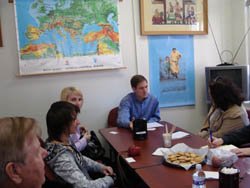
Professor Randall Stone, keynote speaker hosting a delegation of educators from Poltava, Ukraine sponsored by the Irondequoit-Poltava Sister Cites Committee.
Meanwhile, a growing financial crisis in Europe created new strains within the
European Union. Greece was compelled to turn to its European partners and the
International Monetary Fund for a rescue as investors fled from its bond market this
spring, driving the yields on Greek bonds to unsustainable levels, and the EU and the IMF
announced a trillion-euro plan to reassure the markets of the weaker members of the
Union. Even as the ink began to dry on the new plan, however, riots broke out in Greece
over the stringent terms of the rescue plan, and bond holders again started to run for
cover. Nevertheless, Central European countries, including Poland, have reaffirmed their
intentions to adopt the euro. Ironically, with a few exceptions, it is only the countries that
have not yet joined the euro zone that have upheld the rules that limit the size of its
members’ budget deficits.
The last year has been a busy one at the Skalny Center, and not only because of
the dramatic events in Europe. The first event of this academic year was a talk on “Global
Climate Change: the Polish Perspective,” by a special guest from the Polish Embassy.
Professor Marek Konarzewski is Minister Counselor for Science and Technology Affairs.
Our evening lectures also covered the politics of private affairs in Poland, and the cultural
and economic development of the city of Lodz. On April 20, the Skalny Center and the
English Department hosted a famous Polish poet, Piotr Sommer, who came from Warsaw
to read from his recently published book of poems translated into English, Continued.
Sommer has published several dozen books of poetry (his own and translations), literary
criticism, and anthologies. He is also a well-known translator of contemporary English-
language poets and is the editor of Literatura na Świecie (World Literature), a Warsaw-
based magazine of international writing.
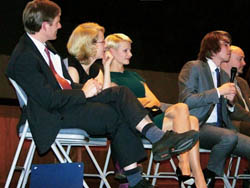
Opening of Polish Film festival. From left: Randall Stone, Brabara Klich-Kluczewska, Małgorzata Kożuchowska, Eric Glowacki and Bob Russell.
A highlight of the year was our celebration of the 200th anniversary of Fryderyk Chopin's birth. In New York, Paris, London, Vienna, and of course his native Warsaw, the leading Polish composer of the Romantic period is being honored with concerts, international piano competitions, and exhibits. The year 2010 was proclaimed by the Sejm of the Republic of Poland as the Year of Fryderyk Chopin. To celebrate the anniversary in Rochester, the Skalny Center organized two concerts of Chopin’s music. The frirst, “Chopin for cello,” was a cello recital by Ignacy Grzelazka. The second event, “Chopin in Music and ” was organized in cooperation with Nazareth College and the Polish Heritage Society of Rochester, and took place at Kilbourn Hall, Eastman School of Music. Chopin’s music was performed by Brian Preston ( Nazareth College, piano), Janusz Skowron ( Academy of Music, Kraków, Poland, piano), Johnandrew Slominski (Eastman School of Music, piano), Rosa Villar Cordova (Boston Conservatory, piano), Ignacy Grzelązka (Boston Conservatory, cello), and Emily worek Helenbrook, soprano. Passages from Chopin’s letters were read by Matthew Ames (Theatre Department, Nazareth College.) The audience was standing room only, and the concert was deeply moving. Fragments of letters Chopin wrote during his life, from the beginning of his career until last years of his life, are included in this Newsletter.
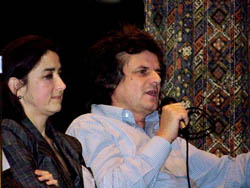
Opening of Polish Film festival. Małgorzata Szum and Jacek Bławut.
In November we held our annual Polish Film Festival at the Little Theatre, with financial support from the Polish Filmmakers Association and Polish Film Institute. We showed six new feature films, selected documentaries, and four short theme films which were directors' debuts under the Polish Filmmaker Association's "30 minutes" and "First Documentary" programs. We hosted several special guests, including film director Jacek Bławut and his crew, movie star Małgorzata Kożuchowska, Polish diplomat Małgorzata Szum, Counselor for Culture and Public Relations Attaché, Embassy of the Republic of Poland, and Sheila Skaff (Hunter College, New York, NY.) I had the pleasure of being interviewed with Ms. Kożuchowska on local television, and the guests participated in roundtable discussions following their movies. We commemorated the 70th anniversary of the beginning of WWII by screening the film "Tomorrow we are going to the movies," which depicts the story of three Warsaw high school graduates of the class of 1938, who come of age as Poland faces the Nazi invasion. After the screening, six WWII survivors who remembered its outbreak shared their memories with the audience. The participants were Sophia Amm, Sabina Slepecki, Eugene Slepecki, and Ann Bukowska-Taylor from Rochester, and Helena Golebiowska and Krystyna Pienkowska from Buffalo. Moderating that discussion was among the most moving experiences I have had as Skalny Center Director, as the participants recounted their childhood memories of the war: relatives executed, homes and personal belongings looted, and fleeing from approaching armies. Along the way there were flashes of humor and heroism, and one woman recounted how her family concealed a young Jewish girl from the Gestapo.
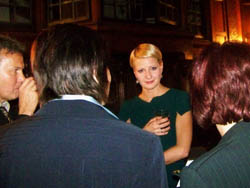
Małgorzata Kożuchowska at the reception on the opening night of the Polish Film festival.
The Center hosted several visiting professors and researchers this year,
including Dr. Olesya Tkacheva (Ph.D. 2009, University of Michigan), who traveled to
Poland last fall to research the political impact of the internet. Last fall Dr.
Barbara Klich-Kluczewska (Institute of History, Jagiellonian University, Kraków, Poland)
taught a course on "Communism and Democracy in Eastern Europe," and this spring, Dr.
Magdalena Modrzejewska (Institute of American Studies, Jagiellonian University) taught
"Eastern Europe: Philosophy and Reform." In addition, the Skalny Center continues to
offer beginning and intermediate level courses in Polish language. Thanks to a generous
gift from the late Joseph Skalny, the Center provided scholarships for four students to
attend a University of Rochester summer program in Kraków. During the 4-week program,
offered through the Jagiellonian University School of Polish Language and Culture,
students will take a Polish language course and a course on Polish history, Polish
literature, or politics.
Events to look forward to next fall include a celebration of Jan Paderewski on October 17
and the opening of the Polish Film Festival on November 12 with a piano recital by Wlodek Pawlik. Pawlik is a famous Polish jazz composer and piano player who composed the music for "Reverse," a film that will be shown at the Festival. I look forward to seeing you at some of our events!

